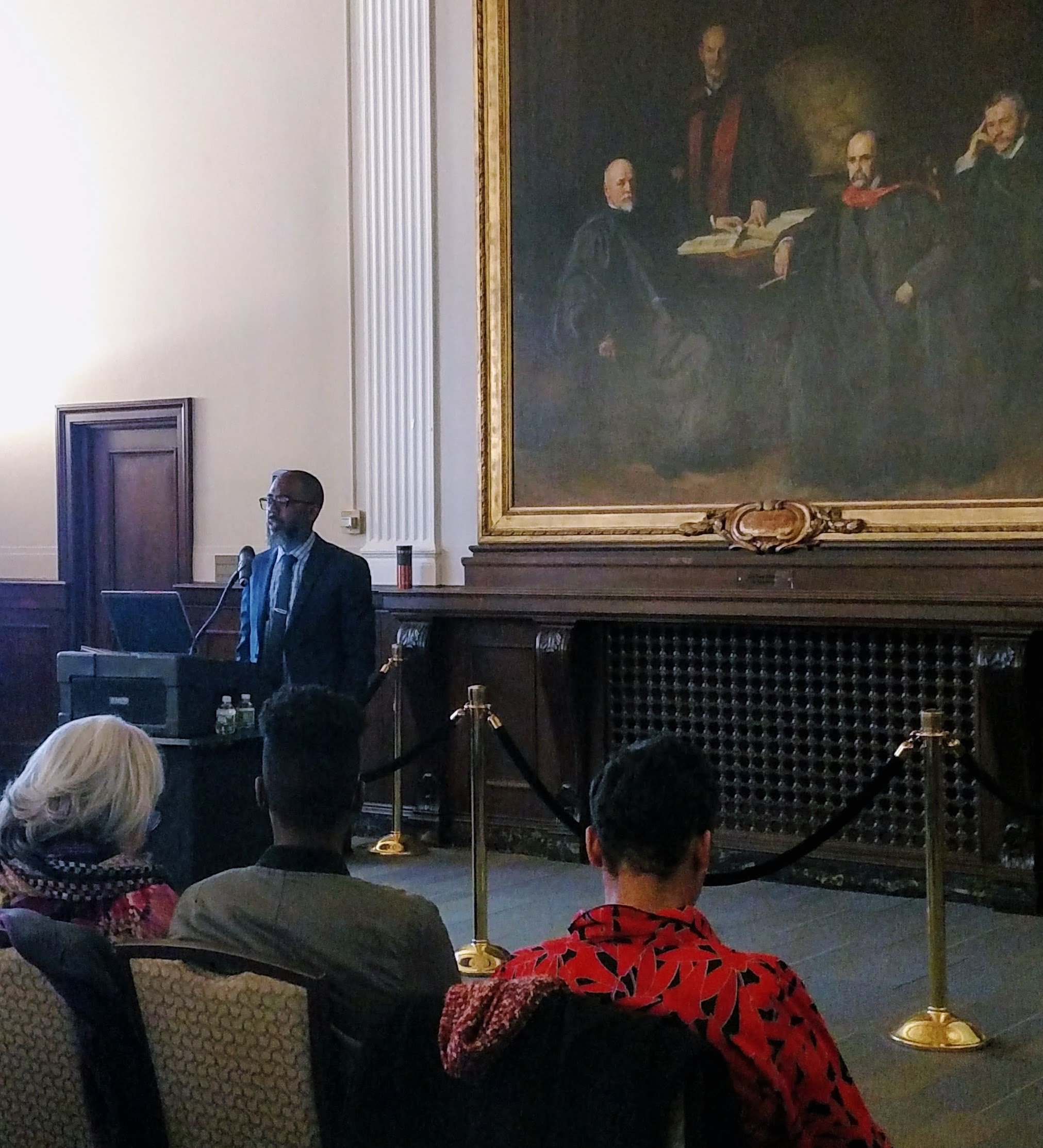
Find the Midwife Project Launch
CFP: New Perspectives in the History of Child Health
**2024 Workshop and Special Issue: Call for Proposals**
Call for paper proposals for an international workshop on child health history hosted at the University of Fribourg, Switzerland, on June 21-22, 2024. There is support available for travel and lodging. The workshop is sponsored by: The Swiss National Science Foundation (SNSF) and the University of Fribourg
In bringing together junior and senior scholars working on issues surrounding children’s health and healthcare, the workshop aims at developing a series of articles for a special issue journal focusing on child health and children’s experiences of health and illness from a historical perspective. Though the field of children’s history has grown over the past thirty years, it deserves more attention from historians of medicine and public health. Therefore, the workshop aims to underscore the importance of child health as a field of research and point to its potential for historical and historiographical interventions in the history of medicine and public health. In addition to historians, we encourage paper proposals from scholars working at the intersections of histories of children’s health, disability studies, non-western areas of study, healthcare disparities, health policy, sociology, anthropology, or other related fields. We especially encourage submissions from scholars whose work focuses on child health in low- and middle-income non-Western countries. Applicants must be prepared to submit a full working draft of their paper prior to the meeting. The workshop will be led by Jason Chernesky (Johns Hopkins University; jcherne2@jhmi.edu), Janet Golden (Rutgers University; jgolden@camden.rutgers.edu), and Felix Rietmann (University of Fribourg; felix.rietmann@unifr.ch).
Please submit an abstract (max. 300 words) and a brief CV here. The deadline for submission is Friday, December 1, 2023. All questions can be addressed to Jason M. Chernesky: jcherne2@jhmi.edu
Visual Histories of Humor and Health: A Virtual Symposium
New “For the Medical Record” Mini Episode with Zubin Mistry
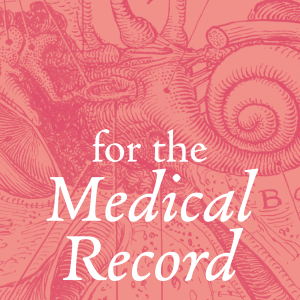
New “For the Medical Record” Mini Episode with Rana Hogarth

Exploring the Opioid Industry Documents: Research Communities, Educational Opportunities, and Community Data
Webinar
For the full webinar recording, click here. The recordings for the individual talks can be found below.
11:00 – 11:45 Webinar Plenary Talk:
“Voices and Stories in the Digital Archive: Reflections on the Making of Pushing Cool and Insights for Storytelling from the Opioid and Tobacco Archives”
Keith Wailoo, PhD – Henry Putnam University Professor of History and Public Affairs, Princeton University
A recording of Keith Wailoo’s talk can be found here
11:45 – 12:15 Introduction to the Industry Documents Library (IDL) and Opioid Industry
Documents Archive (OIDA)
Kate Tasker, IDL Managing Archivist, UCSF
A recording of Kate Tasker’s talk can be found here
12:15 – 12:45 Researchers’ Experience Using OIDA
Adam Koon, PhD; MPH – Assistant Scientist, Johns Hopkins Bloomberg School of Public Health
“The Opioid Industry Documents Archive: New Directions in Research”
A recording of Adam Koon’s talk can be found here
Gaurab Bhardwaj, PhD; MBA – Associate Professor of Strategy, Babson College
“Searching the Opioid Industry Documents Archive”
A recording of Gaurab Bhardwaj’s talk can be found here
12:45 – 1:00 Break
Workshop
1:00 – 2:00 Exploring the OIDA Collections: Search Strategies and Discussion (open to registered attendees only)
New “For the Medical Record” Episode with Jessica Leigh Hester

New “For the Medical Record” Mini Episode with Courtney Thompson

New “For the Medical Record” Episode with Walker Magrath

New “For the Medical Record” Mini Episode with Alexandre White Released
New “For the Medical Record” Episode Released

Conference: Achieving Health Equity in a World of Data
Making Space for Social Medicine in Medical School Curricula: Transnational Perspectives and Pedagogy
Making Space for Social Medicine in Medical School Curricula: Transnational Perspectives and Pedagogy
Conference: Reckoning with Race & Racism in Academic Medicine
Title: Reckoning with Race & Racism in Academic Medicine
What: Two-day hybrid conference, for more information visit https://hopkinshistoryofmedicine.org/conf-reckoning-with-racism-med/
Where: Hybrid – Virtual & Armstrong 150 West
When: Thursday, May 5th and Friday, May 6th
Who: All are welcome to attend virtually. In person registration is limited to invited speakers and guests and Hopkins Affiliates. Numbers will be capped to ensure distancing.
How to Register: Visit https://hopkinshistoryofmedicine.org/conf-reckoning-with-racism-med/
Conference: Reckoning with Race & Racism in Academic Medicine
Title: Reckoning with Race & Racism in Academic Medicine
What: Two-day hybrid conference, for more information visit https://hopkinshistoryofmedicine.org/conf-reckoning-with-racism-med/
Where: Hybrid – Virtual & Armstrong 150 West
When: Thursday, May 5th and Friday, May 6th
Who: All are welcome to attend virtually. In person registration is limited to invited speakers and guests and Hopkins Affiliates. Numbers will be capped to ensure distancing.
How to Register: Visit https://hopkinshistoryofmedicine.org/conf-reckoning-with-racism-med/
Trans/Medicine Workshop
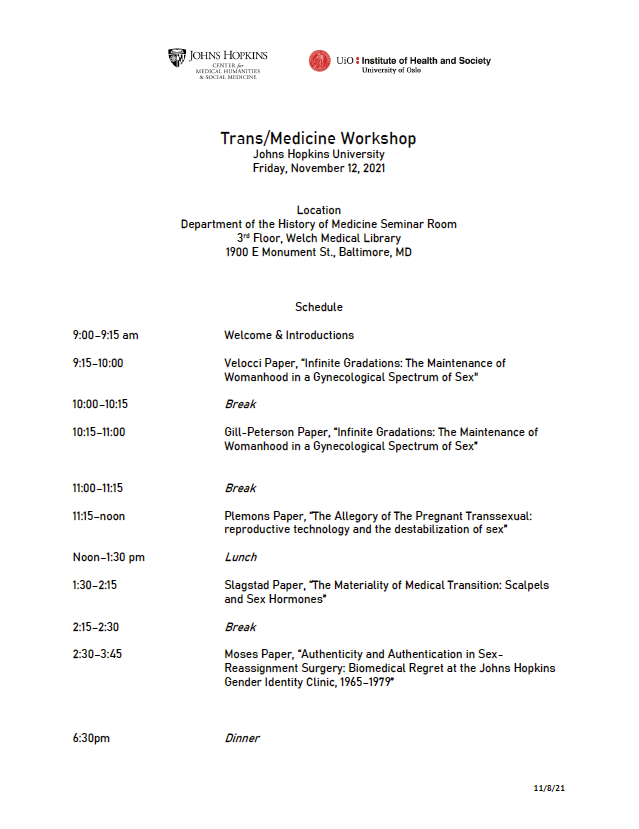
Susceptibility, Surveillance, and Stigma: A Conversation on History, Infectious Disease, and Genomics
Black Beyond Data: Combating Racial Injustice Through the Digital Humanities: An Introduction
Bioethics: Reckoning with Structures
VERDANT MEDICINE: Hildegard’s Resonant Apothecary
Global Health, Justice, & Activism
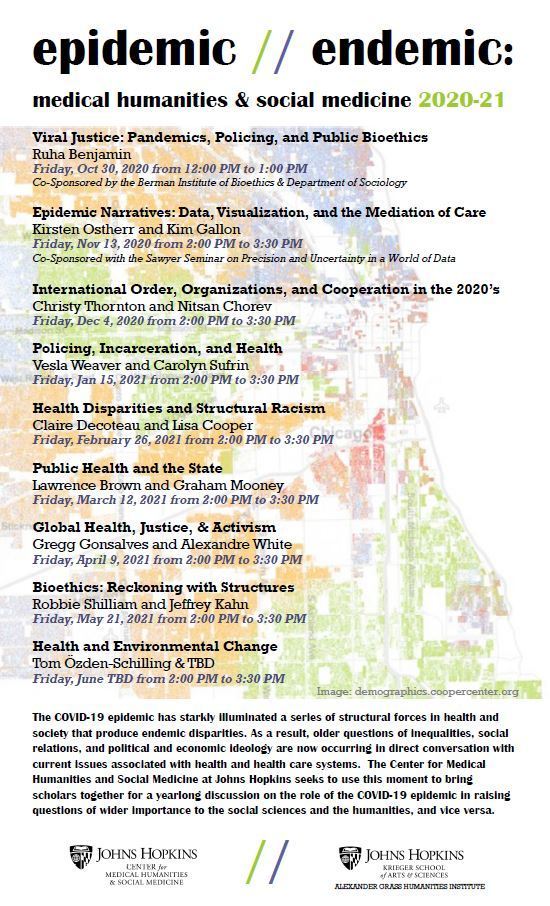
Public Health and the State

Health Disparities and Structural Racism

Conference: Critical Conversations on Reproductive Health/Care: Past, Present, and Future
Place: Online Conference, event links will be sent to those who register. Dates: February 3-7, 2021
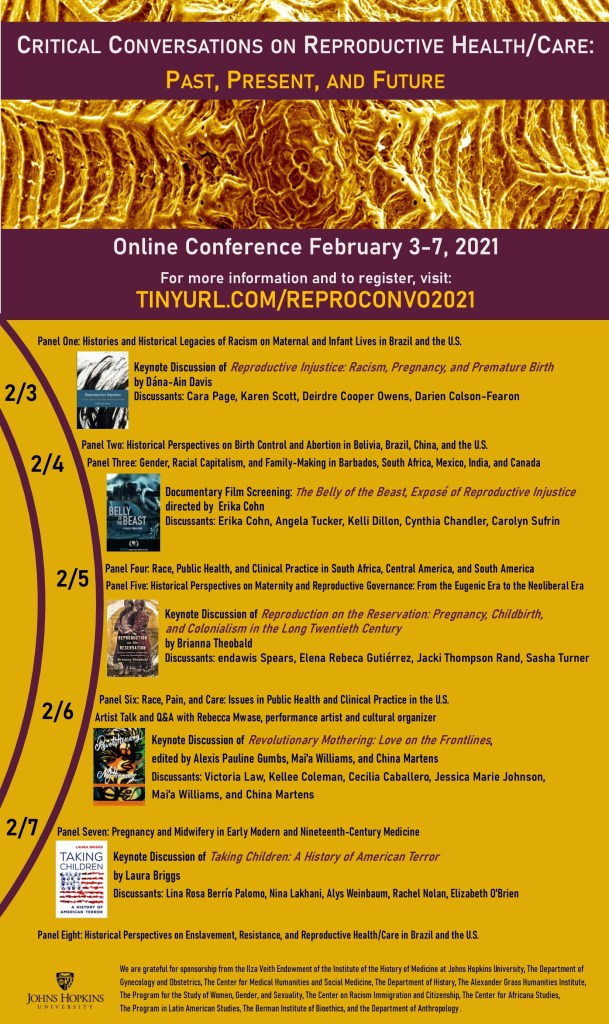
THANKS TO OUR SPONSORS
We are grateful for sponsorship from the Ilza Veith Endowment of the Institute of the History of Medicine at Johns Hopkins University, The Department of Gynecology and Obstetrics, The Center for Medical Humanities and Social Medicine, The Department of History, The Alexander Grass Humanities Institute, The Program for the Study of Women, Gender, and Sexuality, The Center on Racism Immigration and Citizenship, The Center for Africana Studies, The Program in Latin American Studies, The Berman Institute of Bioethics, and the Department of Anthropology.DRAFT SCHEDULE:
WEDNESDAY FEBRUARY 3
1:30 pm- 2:45 p.m.
Panel One: Historical Perspectives on Sterilization, Reproductive Governance, and Obstetric Violence3:00-3:30 p.m.
Opening remarks from the Johns Hopkins University School of Medicine3:30- 5:00 p.m.
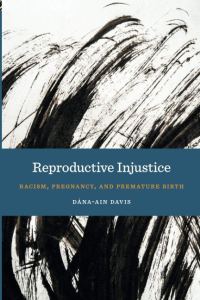 Keynote Discussion of Reproductive Injustice: Racism, Pregnancy, and Premature Birth, by Dána-Ain Davis, Professor of Urban Studies and Anthropology and director of the Center for the Study of Women and Society at the Graduate Center of the City University of New York.
Featuring
Cara Page, Cultural/Memory Worker, Curator & Organizer
Karen Scott, Associate Professor and OBGYN Hospitalist in the Department of Obstetrics and Gynecology at the University of California, San Francisco
Deirdre Cooper-Owens, Charles and Linda Wilson Professor in the History of Medicine at the University of Nebraska-Lincoln
Carolyn Sufrin, Assistant Professor of Gynecology and Obstetrics at the Johns Hopkins University School of Medicine
Keynote Discussion of Reproductive Injustice: Racism, Pregnancy, and Premature Birth, by Dána-Ain Davis, Professor of Urban Studies and Anthropology and director of the Center for the Study of Women and Society at the Graduate Center of the City University of New York.
Featuring
Cara Page, Cultural/Memory Worker, Curator & Organizer
Karen Scott, Associate Professor and OBGYN Hospitalist in the Department of Obstetrics and Gynecology at the University of California, San Francisco
Deirdre Cooper-Owens, Charles and Linda Wilson Professor in the History of Medicine at the University of Nebraska-Lincoln
Carolyn Sufrin, Assistant Professor of Gynecology and Obstetrics at the Johns Hopkins University School of Medicine
THURSDAY FEBRUARY 4
2:30 – 3:45 p.m.
Panel Two: Historical Perspectives on Birth Control and Abortion in Bolivia, Brazil, China, and the U.S.4:00- 5:15 p.m.
Panel Three: Reproduction, Racial Capitalism, and Family-Making in Barbados, South Africa, Mexico, and Canada6:00- 8:15 p.m.
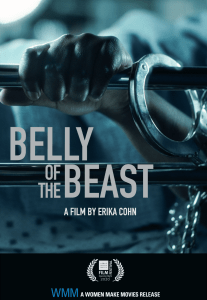 Documentary Film Screening: The Belly of the Beast, Exposé of Reproductive Injustice
Panel Discussion and Q&A with
Film Director Erika Cohn
Film Producer Angela Tucker
Film Participant Kelli Dillon
Film Participant Cynthia Chandler
Darien Colson-Fearon, MD Candidate at the Johns Hopkins University School of Medicine
Documentary Film Screening: The Belly of the Beast, Exposé of Reproductive Injustice
Panel Discussion and Q&A with
Film Director Erika Cohn
Film Producer Angela Tucker
Film Participant Kelli Dillon
Film Participant Cynthia Chandler
Darien Colson-Fearon, MD Candidate at the Johns Hopkins University School of Medicine
FRIDAY FEBRUARY 5
1:00 – 2:15
Panel Four: Race-Making in Public Health and Clinical Practice in South Africa, Central America, and South America3:00 – 4:15
Panel Five: Pregnancy and Midwifery in Early Modern Medicine5:00- 6:30 p.m.
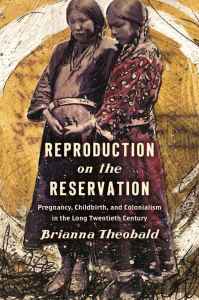 Keynote Discussion of Reproduction on the Reservation: Pregnancy, Childbirth, and Colonialism in the Long Twentieth Century by Brianna Theobald, Assistant Professor of History at the University of Rochester
Featuring
endawis Spears, Director of Programming & Outreach, Akomawt Educational Initiative
Elena Rebeca Gutiérrez, Associate Professor, Gender and Women’s Studies; and Latin American and Latino Studies
Jacki Thompson Rand, Associate Professor, Department of History, University of Iowa
Sasha Turner, Associate Professor of History and the History of Medicine at Johns Hopkins University
Keynote Discussion of Reproduction on the Reservation: Pregnancy, Childbirth, and Colonialism in the Long Twentieth Century by Brianna Theobald, Assistant Professor of History at the University of Rochester
Featuring
endawis Spears, Director of Programming & Outreach, Akomawt Educational Initiative
Elena Rebeca Gutiérrez, Associate Professor, Gender and Women’s Studies; and Latin American and Latino Studies
Jacki Thompson Rand, Associate Professor, Department of History, University of Iowa
Sasha Turner, Associate Professor of History and the History of Medicine at Johns Hopkins University
SATURDAY FEBRUARY 6
11:00 a.m -12:15 p.m. Panel Six: Race, Pain, and Care: Issues in Public Health and Clinical Practice in the U.S. 1:00 p.m. – 2:15 p.m. Workshop and Q&A with Rebecca Mwase, performance artist and cultural organizer 3:00- 4:30 p.m.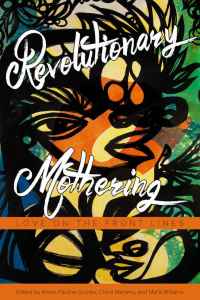 Keynote Discussion of Revolutionary Mothering: Love on the Frontlines, edited by Alexis Pauline Gumbs, Mai’a Williams, and China Martens
Featuring
Victoria Law, freelance author, editor, and organizer
Kellee Coleman, organizer with Vibrant Woman/Mama Sana prenatal clinic
Tanay Lynn Harris, co-founder of the Bloom Collective Baltimore
Cecilia Caballero, PhD Candidate at the University of Southern California
China Martens, organizer, editor, and author
Mai’a Williams, journalist, organizer, editor, and author
Jessica Marie Johnson, Assistant Professor of History at Johns Hopkins University
Keynote Discussion of Revolutionary Mothering: Love on the Frontlines, edited by Alexis Pauline Gumbs, Mai’a Williams, and China Martens
Featuring
Victoria Law, freelance author, editor, and organizer
Kellee Coleman, organizer with Vibrant Woman/Mama Sana prenatal clinic
Tanay Lynn Harris, co-founder of the Bloom Collective Baltimore
Cecilia Caballero, PhD Candidate at the University of Southern California
China Martens, organizer, editor, and author
Mai’a Williams, journalist, organizer, editor, and author
Jessica Marie Johnson, Assistant Professor of History at Johns Hopkins University
SUNDAY FEBRUARY 7
11:00 a.m -12:15 p.m.
Panel Seven: Global Perspectives on Reproductive Governance and Obstetric Violence1:00- 2:30 p.m.
 Keynote Discussion of Taking Children: A History of American Terror by Laura Briggs, Professor of History at The University of Massachusetts Amherst and
Featuring
Rachel Nolan, Freelance journalist and Assistant Professor of International Relations at the University of Boston
Nina Lakhani, Journalist for The Guardian and freelance author
Lina Rosa Berrío Palomo, Profesora-investigadora de Antropología Social en CIESAS Pacifico Sur
Elizabeth O’Brien, Assistant Professor of the History of Medicine at Johns Hopkins University
Keynote Discussion of Taking Children: A History of American Terror by Laura Briggs, Professor of History at The University of Massachusetts Amherst and
Featuring
Rachel Nolan, Freelance journalist and Assistant Professor of International Relations at the University of Boston
Nina Lakhani, Journalist for The Guardian and freelance author
Lina Rosa Berrío Palomo, Profesora-investigadora de Antropología Social en CIESAS Pacifico Sur
Elizabeth O’Brien, Assistant Professor of the History of Medicine at Johns Hopkins University
3:00- 4:15 p.m.
Panel Eight: Historical Perspectives on Enslavement, Resistance, and Reproductive Health/Care in Brazil and the U.S.STATEMENT OF INTENT:
Scholars from across disciplines at the Johns Hopkins University and School of Medicine are organizing a conference entitled “Critical Conversations on Reproductive Health/Care: Past, Present, and Future,” to take place during the first week of February 2021. This conference will bring together historians, anthropologists, pregnancy caregivers, artists, activists, and journalists to address key issues in the history of reproduction and the practice of reproductive medicine. We are particularly interested in how reproductions intersect with phenomenon such as, but not limited to: midwifery, parenting, and kinship-making; trauma in obstetric and abortion care; obstetric racism in the past and present; colonialism, migration, and displacement; and incarceration and detention. The virtual meeting will consist of a series of conversations spread over multiple days, and with multiple forms of interaction. It will feature “reverse keynotes,” or discussions of key new books by leading scholars, as well as panel discussions about pre-circulated papers. In addition, there will be a documentary film screening and discussion, as well as community-centered discussions with maternal healthcare activists and artist Rebecca Mwase. Recognizing that “reproduction” is a loaded term, in part, due to its capitalistic productive connotation, we intend to clarify the complexities of the term by interrogating reproduction as a site of intense struggle for healthcare access and justice; as the site of pressing issues regarding incarceration and decarceration; and as a site of the production and reification of settler-colonial and neo-colonial narratives about race, nation, and autonomy. We further recognize that activists of color have redefined modern-liberal, whitecentered, and individualistic notions of reproductive choice, and that they have done so by promoting the intersectional teachings of reproductive justice. Inspired by this tradition—and recognizing our limits in engaging with it and drawing on its analytics in our own work—we aim to recognize and learn from historic legacies while envisioning reproductive futures based on dignity, solidarity, and historically-informed collective action. We also aim to engage with the intimate aspects of reproductive care/taking, especially by unpacking complex notions of parenting, nurturing, and care. In the context of the COVID-19 crisis—which is laying bare the destructive logic of racial capitalism—we recognize that there is no way to “go back to normal.” We must instead envision a radically different future, guided by questions of what kind of society are we producing, reproducing, and nurturing. Can we insist on the value of reproductive labor without ascribing a moralized or normative view of caretaking? How do these discourses come to bear on reproductive health/care, past and present?CALL FOR PAPERS (CLOSED):
We welcome proposals for papers on various aspects of reproduction, from any epoch and place, such as (but not limited to) those that seek to:- Examine gender and reproduction in early modern and pre-modern times.
- Engage with the history and practice of nursing and midwifery, especially in light of the World Health Assembly’s designation of 2020 as the International Year of the Nurse and the Midwife.
- Explore the boundaries between reproduction, parenting, and reproductive labor.
- Reimagine health/care by interrogating the ways that communities, healthcare systems, and universities engage with the social structures that define or provide access to high-quality reproductive healthcare; historicize the barriers to accessing high-quality reproductive healthcare.
- Expose the history and practice of obstetric violence; highlight grassroots, scholarly, and legal activism against violations of people’s dignity during reproduction and childbirth.
- Interrogate the use of racialized risk calculators in obstetric and reproductive healthcare.
- Examine affect and emotion in reproductive healthcare, including people’s responses to emergency medical procedures such as hysterectomy.
- Analyze how reproduction intersects with mass incarceration, decarceration, depopulation, and abolition.
- Address immigration and reproduction of the national body politic by analyzing detention and the use of violence to force the reproductive, care-based, and family choices of migrants, refugees, and their families; including, for example, the forced separation of migrants and refugees from their children.
Convocatoria para la presentación de ponencias: “Diálogos Críticos Sobre la Medicina Reproductiva: Pasado, Presente, y Futuro.”
Lugar: Online Fechas: Semana del 1º al 7 de febrero de 2021 Idiomas: Ingles y español Profesores, investigadores, y médicos de la Universidad de Johns Hopkins y la Escuela de Medicina de Johns Hopkins (Baltimore, MD), organizarán un congreso llamado “Diálogos Críticos Sobre la Medicina Reproductiva: Pasado, Presente, y Futuro”, el cuál se llevará a cabo durante la primera semana del mes de febrero del año 2021. Este congreso reunirá a historiadores, antropólogos, trabajadores de la salud maternal, artistas, activistas, y periodistas para abordar aspectos claves en la historia de la reproducción y la práctica de la medicina reproductiva. Nos interesa revisar especialmente la forma en que las reproducciones se interrelacionan con fenómenos como: la partería, la crianza de los hijos, los traumas en la atención obstétrica, la interrupción voluntaria del embarazo; el racismo obstétrico en el pasado y el presente; el colonialismo, la migración y el desplazamiento, así como la encarcelación y la detención de mujeres, migrantes y niños, entre otros temas. El encuentro virtual consistirá en una serie de charlas y conferencias durante varios días con multiples formas de interacción en línea. Contará con “discursos inaugurales al reves,” o discusiones de nuevos libros de destacados académicos, así como mesas de discusión sobre ponencias pre-circuladas. Además, el congreso contará con la proyección de un documental, una discusión con activistas de la salud materna, y la participación de la artista Rebecca Mwase. Reconociendo que “la reproducción” es una categoria de análisis compleja, en parte, debido a su connotación con la producción capitalista; nos proponemos clarificar las complejidades del término, interrogando la reproducción como un sitio de intensa lucha por el acceso a la asistencia y la justicia médica. También como el lugar de problemas apremiantes relativos a la encarcelación y la decarcelación; y como escenario de la producción y codificación de las narrativas coloniales y neo-coloniales sobre la raza, la etnicidad, la nación, y la autonomía. Por otra parte, reconocemos que los activistas de color han redefinido los paradigmas de los derechos reproductivos, que solían ser centrados bajo una mirada individualista, eurocéntrica y proveniente de una ideología moderno-liberal. Inspirados por esta tradición crítica -y reconociendo nuestros limites al comprometernos con ella y al utilizar sus análisis en nuestro propio trabajo-, nos orientamos a reconocer y aprender de los legados históricos, al tiempo que visualizamos futuros reproductivos basados en la dignidad, la solidaridad, y la acción colectiva históricamente informada. También nos comprometemos con los aspectos íntimos del labor y cuidado reproductivo, especialmente desentrañar las nociones complejas relacionadas con la crianza, el afecto y la labor emocional de los cuidados reproductivos. En el contexto de la crisis mundial del COVID-19, que ha expuesto la lógica destructiva del capitalismo racial, admitimos que no hay manera de volver a la “normalidad.” Por el contrario, consideramos que es necesario imaginar un futuro radicalmente diferente guiados por preguntas como: ¿Qué tipo de sociedad estamos produciendo, reproduciendo y fomentando?, ¿Podemos insistir en el valor del trabajo reproductivo sin atribuir una visión moralizada o normativa de la atención? ¿De qué manera estos discursos se relacionan con la salud/cuidado reproductivo, en el pasado y el presente? Son bienvenidas las ponencias sobre cualquier aspecto de reproducción, de cualquier época y lugar, tal como las que se anuncian a continuación:- Examinar el género y la reproducción en tiempos pre-modernos y en la modernidad temprana
- Involucrarse con la historia y la práctica de la enfermería y la partería, especialmente a la luz de la designación por parte de la Asamblea Mundial de la Salud del año 2020 como el Año
- Internacional de la Enfermera y la Partera.
- Explorar las diferencias entre la reproducción, la crianza de los hijos, y el labor reproductivo.
- Reconceptualizar la asistencia/médica, interrogando las maneras en que las comunidades, los sistemas de salud, y las universidades interactúan con los sistemas sociales que definen o proporcionan el acceso a la atención medica reproductiva de alta calidad.
- Exponer la historia y la práctica de la violencia obstétrica; resaltar el rol del activismo académico y legal contra las violaciones de la dignidad humana durante la reproducción y el parto.
- Interrogar la racialización de los “calculadores de riesgo” en la atención médica obstétrica y reproductiva.
- Examinar el afecto y la emoción en la asistencia medica, incluyendo las respuestas de las personas a los procedimientos médicos de emergencia como la histerectomía.
- Analizar cómo la reproducción se cruza con el encarcelamiento masivo, la decarcelación, la despoblación y la abolición. Abordar la inmigración y la reproducción del cuerpo político (body politic), analizando la detención y el uso de violencia para influenciar las decisiones reproductivas de los migrantes, los refugiados y sus familias; incluyendo, por ejemplo, la separación forzada de migrantes y refugiados de sus hijos.
[/vc_column_text][/vc_column][/vc_row]
Policing, Incarceration, and Health

Race and Health in the Classroom with Alexandre White & Iro Filippaki
Precision and Uncertainty in a World of Data: Reading Group
More details to come.
International Order, Organizations, and Cooperation in the 2020’s

Photo contest Picturing Pandemic Baltimore
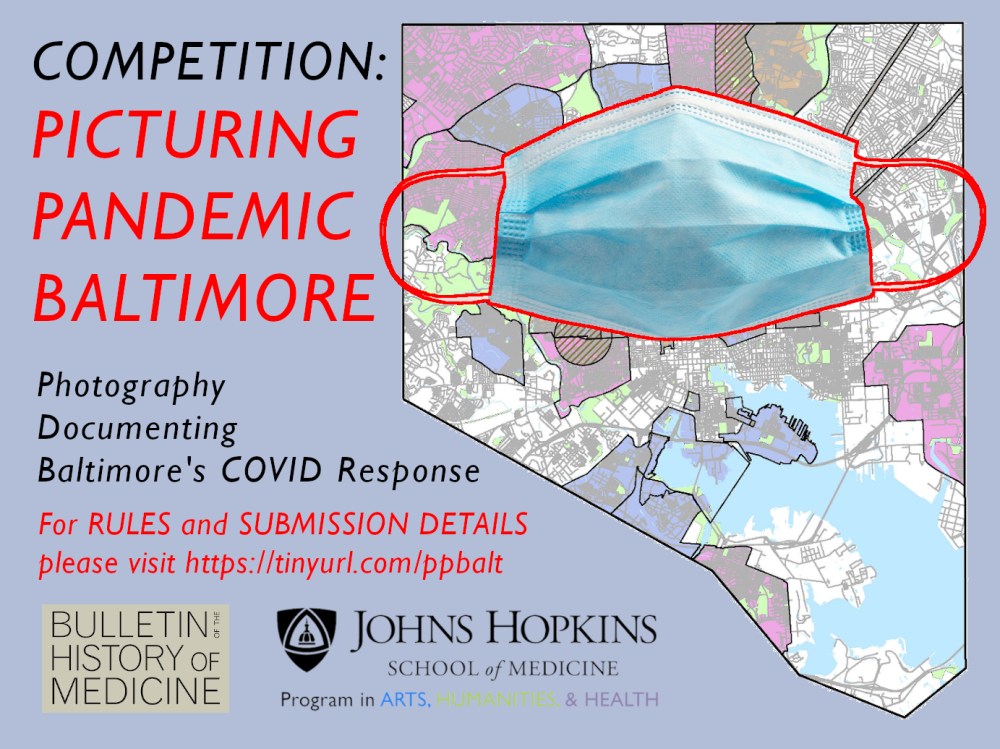
Epidemic Narratives: Data, Visualization, and the Mediation of Care

Viral Justice: Pandemics, Policing, and Public Bioethics

Theater of War presents Antigone in Ferguson
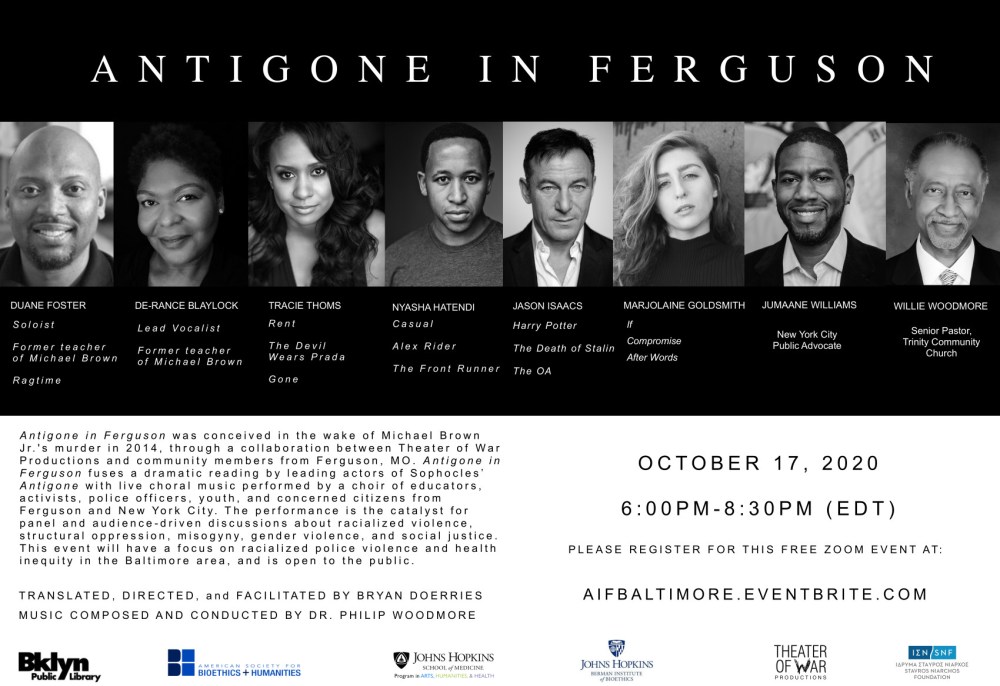
Theater of War for Frontline Medical Providers
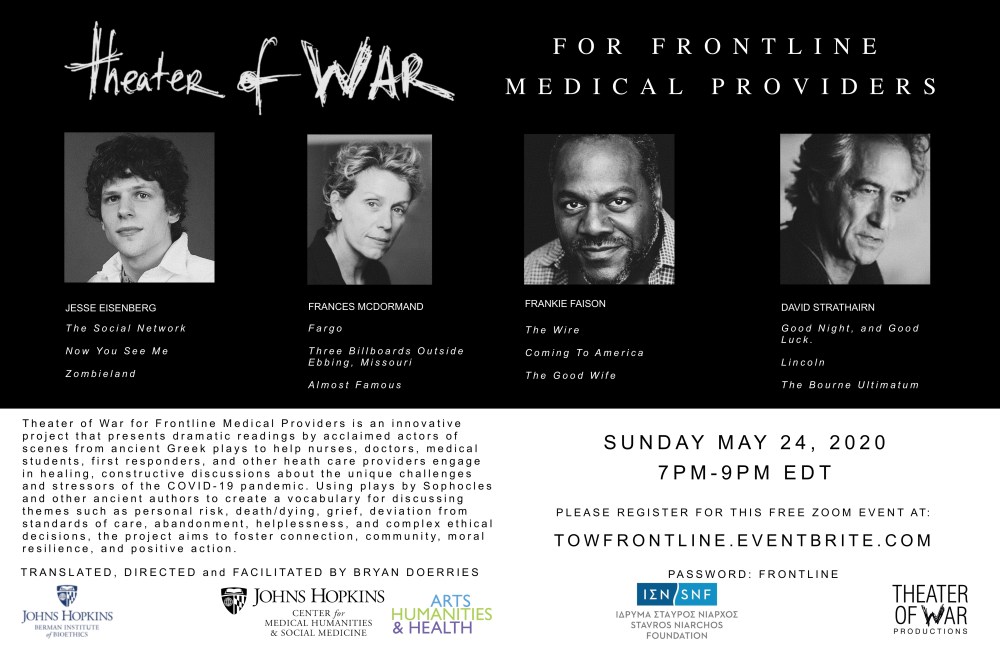
Medicine and Emotion: Empathy and Beyond
THIS EVENT IS PODSTPONED DUE TO COVID-19. MORE INFORMATION WILL BE POSTED HERE SOON.
West Reading Room, Welch Medical Library, 1900 East Monument Street Free event, open to all Sponsored by the Center for Medical Humanities & Social MedicineOne Health Care Community One Book
One Health Care Community One Book proposes to engage members of Johns Hopkins Medicine in a year-long celebration of reading and discussing one story.
“Fidelity,” our inaugural year 2019-2020
“Fidelity,” by Wendell Berry, award-winning author of the National Humanities Medal, is a beautifully written story about the struggle of a family in a rural farming community to cope with medical care provided to a relative at the end of life.Who
Sponsored by AfterWards: An Interprofessional Program in Narrative Medicine, the Center for Medical Humanities and Social Medicine, and the Program for the Arts, Humanities, and HealthWhy
Research shows that narrative medicine- enhances empathy and reflection
- promotes personal and professional growth
- fosters holistic care and compassion
- builds community across the health care professions
- promotes self-care
What
Throughout the year, members of the Hopkins health care community will have opportunities to engage with “Fidelity” through- keynote address
- book conversations
- book talks
- other arts presentations
Where
Practically everywhere throughout Johns Hopkins Medicine! For more information, contact onebook@jhu.edu Lauren Small lsmall2@jhmi.edu Jeremy Greene jgree115@jhmi.eduHow
· Start a conversation. You are warmly invited to read and discuss “Fidelity” with a group of your friends or colleagues anytime and anywhere you like. Download a discussion guide here or contact us to arrange for a facilitator. Contact onebook@jhu.edu for more information. Refreshments provided. · Hear a book talk. RSVP’s are requested but not required. Contact onebook@jhu.edu for more information. · Attend a cultural event. RSVP’s are requested but not required. Contact onebook@jhu.edu for more information.Get started
Download “Fidelity” by clicking on image below and begin reading now! Copies also available at the Bayview Harrison Medical Library and the Welch Medical Library. “Fidelity” is taken from Fidelity: Five Stories, by Wendell Berry, CA: Counterpoint, 2018. Copyright © 1992 by Wendell Berry.
“Fidelity” is used with the author’s permission.
“Fidelity” is taken from Fidelity: Five Stories, by Wendell Berry, CA: Counterpoint, 2018. Copyright © 1992 by Wendell Berry.
“Fidelity” is used with the author’s permission.
You are invited
- to a talk by Dr. Margaret Chisolm of the Department of Psychiatry, titled “Living the good life: lessons from Wendell Berry’s Fidelity,” on January 24 at 12:15 pm, in the Eudowood Room, on the 8th floor of the Children’s Center.
- to a book talk by Dr. Brian Volck, titled “Reading Wendell Berry in Honduras: the neglected role of love in community health,” date and time TBA.
One Book News & Mentions

Psychiatry As Social Medicine Workshop

Conference – Trauma, Narratives, Institutions: Transdisciplinary Dialogues
THIS CONFERENCE IS CO-SPONSORED BY THE CENTER FOR MEDICAL HUMANITIES AND SOCIAL MEDICINE AND THE ALEXANDER GRASS HUMANITIES INSTITUTE
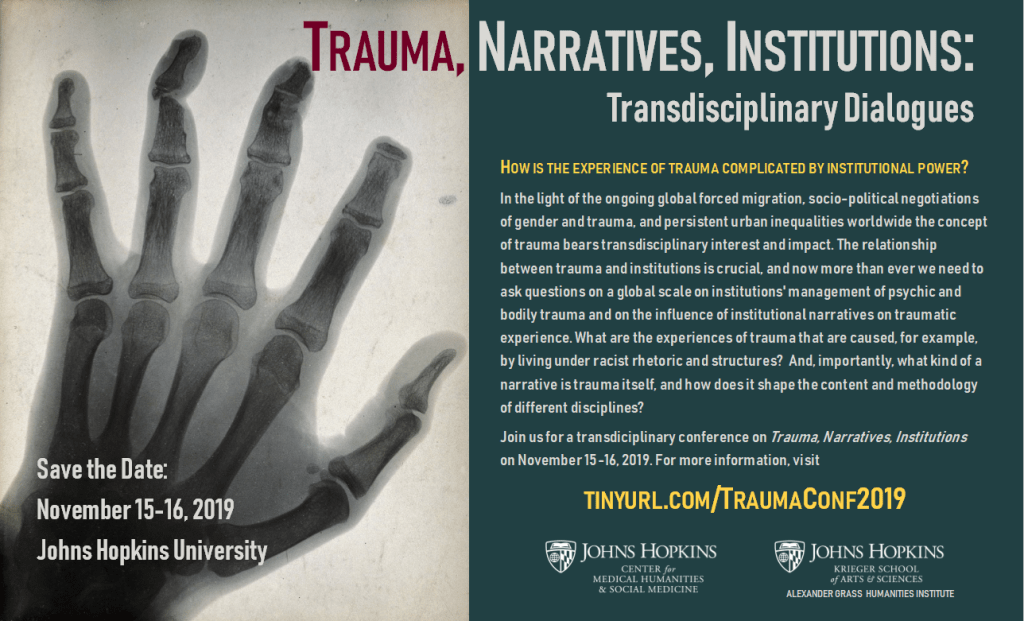
Sawyer Seminar

Indigenous Environments & the Anthropocene

Symposium: Medical Humanities in Policy and Practice
in collaboration with the Concentration on Medicine, Science, & Humanities
Media & Monsters: Two Centuries of Frankensteins
The Work of Diagnosis: Medical Concepts in Social Life
In collaboration with the Department of Anthropology

30th Anniversary of “Seize Control of the FDA”
In collaboration with the Office of Public Health Practice and Training

Introduction:
- Joshua M. Sharfstein, MDVice Dean for Public Health Practice and Community Engagement Professor of the Practice Johns Hopkins Bloomberg School of Public Health
Panel: A Landmark Protest, 30 Years Later
Moderator:- Chris Beyrer MD, MPHDesmond M. Tutu Professor Director, Center for Public Health and Human Rights Johns Hopkins Bloomberg School of Public Health
- Peter StaleyAIDS Activist
- Ann NorthropVeteran journalist and Activist Longtime member of ACT UP (New York) Co-host of news program Gay USA
Panel: Legacy of “Seize Control of FDA” for Public Health
Moderator:- Jeremy A. Greene, MD, PhDProfessor of Medicine and the History of Medicine Elizabeth Treide and A. McGehee Harvey Chair in the History of Medicine Johns Hopkins School of Medicine
- Susan S. Ellenberg, Ph.D.Professor of Biostatistics Professor of Medical Ethics and Health Policy (secondary) Department of Biostatistics, Epidemiology and Informatics Perelman School of Medicine University of Pennsylvania
- Gregg Gonsalves, PhDAssistant Professor, Epidemiology of Microbial Diseases Yale School of Public Health
- Mark HarringtonExecutive Director Treatment Action Group
- David Kessler, MD, JDFormer Commissioner US Food and Drug Administration
The 1918 Influenza Pandemic: Lessons for the Future
In collaboration with Berman Institute of Bioethics

Advocacy and Action: Supporting the Needs of Our Immigrant Neighbors
In collaboration with SOURCE and the Program in Racism, Immigration, & Citizenship
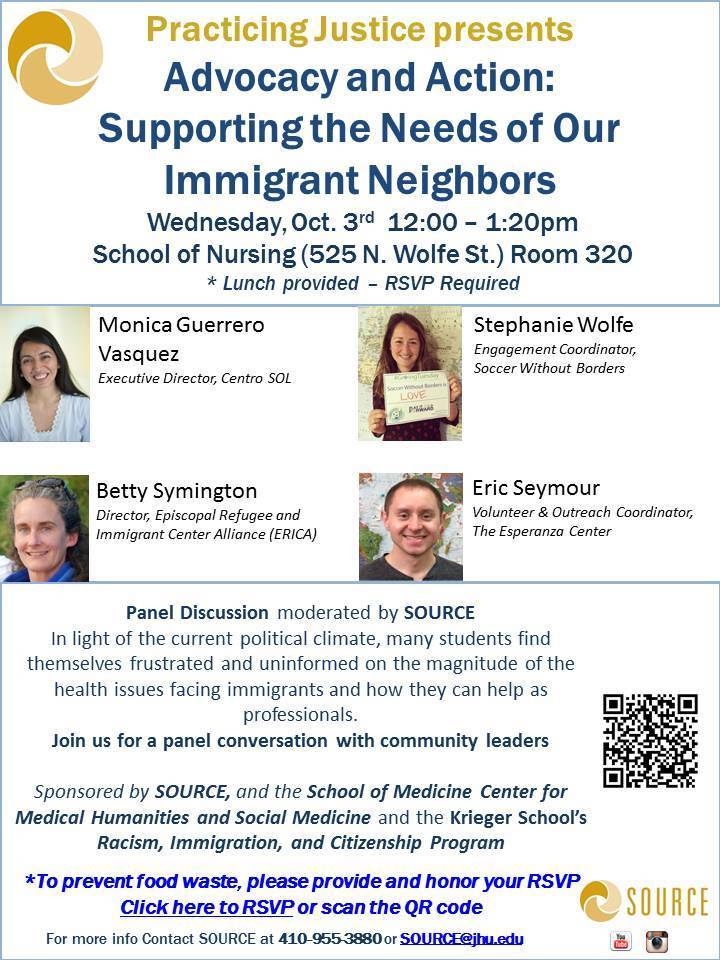
125th Anniversary of the School of Medicine Events
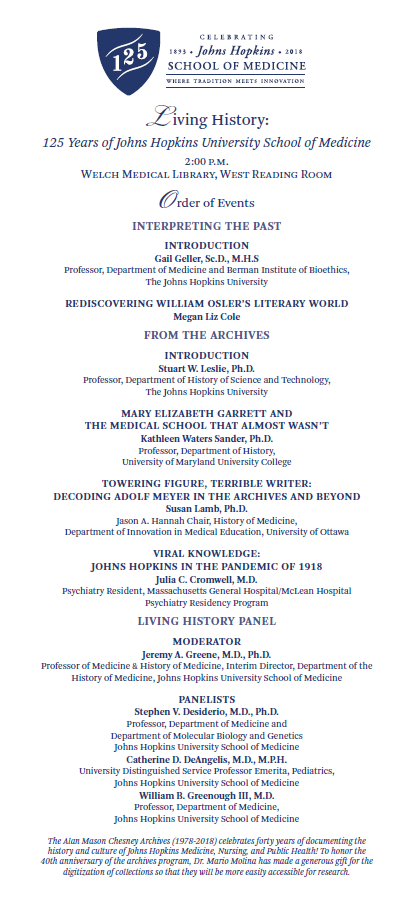
Health, Medicine, & Civil Unrest
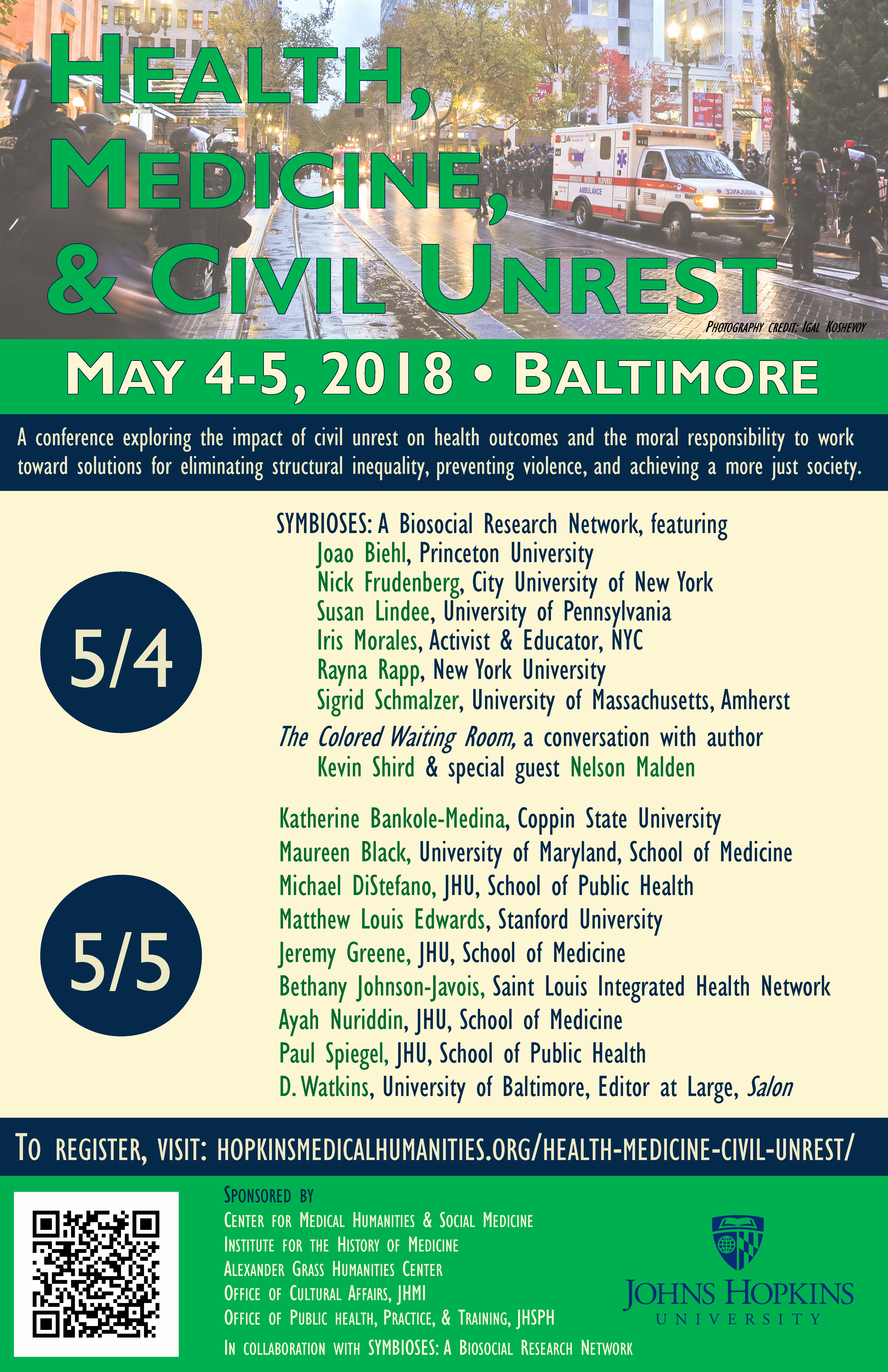 In lieu of a registration fee, please donate to the East Baltimore Historical Library.
In lieu of a registration fee, please donate to the East Baltimore Historical Library.
- Visit http://www.fusiongroup.org/donate and click donate.
- Click "add special instructions to the seller" and type "East Baltimore Historical Library" to donate specifically to the library.
- Enter in the amount.
- Log into paypal or enter your credit card information.
What: CONFERENCE: Health, Medicine, & Civil Unrest When: May 4th & 5th, 2018 Where: Johns Hopkins Medical Campus, Baltimore, MD Why: Civil unrest raises important issues for public health and medicine. Emergency medical services, health care facilities, and health departments play a role in responding to outbreaks in the short and long term. Yet historical trauma, persistent health inequalities and unequal access to medical care contribute to the root causes of unrest. From multiple disciplinary and global perspectives, this conference explores the impact of civil unrest on health outcomes and the moral responsibility to work toward solutions for eliminating structural violence, preventing civil unrest, and achieving a more just society.
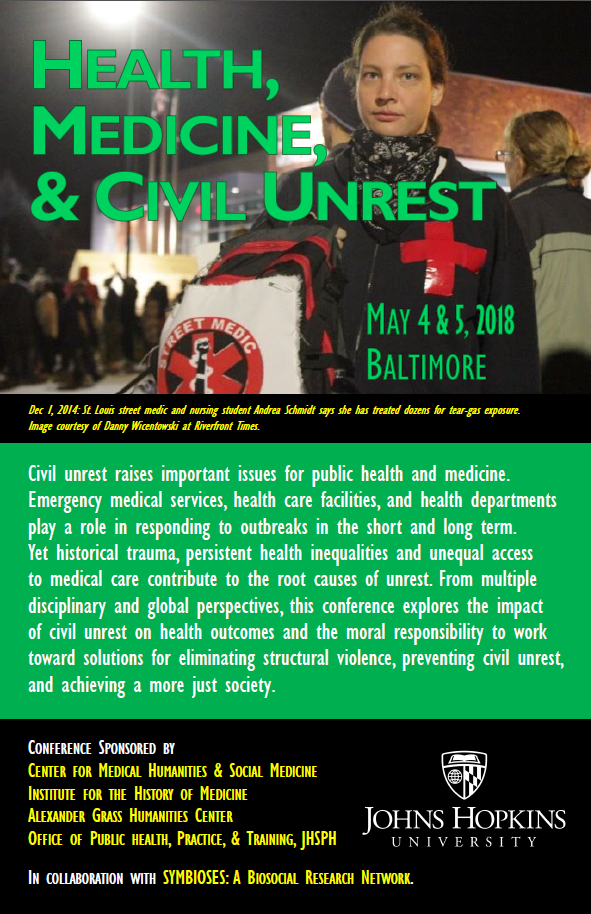
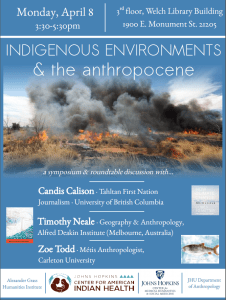

 For more information, or higher resolution, see the
For more information, or higher resolution, see the